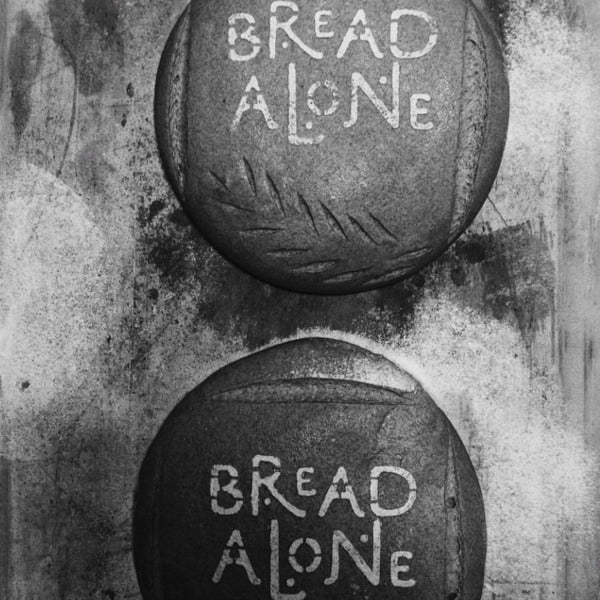Photo from @breadalonebakery
Field grown-grains, ground into powder. Water. Salt. Yeast.
That alone is bread. But Bread Alone? It’s so much more.
Bread Alone is that rare food company managing to gracefully walk the line between being a small-batch, sustainable label more interested in ideals than profits, and a financially-motivated start-up attempting to disrupt and revamp an entire industry.
The duality inherent in the company’s DNA comes into focus – and makes perfect sense – once you meet the company’s founder, Daniel Leader. Perhaps fittingly, he was a philosophy major in college. (Until he dropped out).
PLANTING THE SEED
“I studied philosophy at the University of Wisconsin, and I got a job as a dishwasher,” Leader recalls of the surprising roots of his enterprise. (This was the 1970s.) “It was a crazy situation. I was in a basement wearing hip-high boots with a bunch of other washers, and it was like being in the middle of a car wash. Seven restaurants’ worth of dirty dishes would come at us down a conveyer belt and we’d just go to town.”
Instead of sending him screaming for the library stacks, Leader found he thrived in the sudsy chaos. He made his way up the conveyer belt, landing as a breakfast cook. Ultimately, he decided to abandon the dry theory of Descartes and Sartre for the immediacy and excitement of the kitchen. He enrolled in the Culinary Institute of America in Hyde Park, matriculating around the same time as Anthony Bourdain and enjoying the same “hard, eccentric, brilliant old-school French” instructors that Bourdain writes about with such tart admiration in Kitchen Confidential.
In addition to teaching him knife skills and how to execute a perfectly smooth velouté, his instructors also imparted a devotion to sustainable food ways and the need to focus on the fiscal health of any culinary venture.
Upon graduation, Leader entered what he called “the last great era of French cooking” in New York City, working by day in the kitchens of big hotels, but finding his true passion in the odd jobs he wrangled baking at obscure Italian and French bakeries at night.
“I started spending a lot of time at tiny bakeries in Little Italy, and going to visit small shops in Massachusetts and Vermont to see what they were up to,” Leader says. “Those tiny country bakeries represented the first wave of real American artisanal baking. I wanted to be a part of it.”
TILLING THE SOIL
“There wasn’t even a baking class at the CIA when I went,” Leader says. “I spent time at all of these bakeries, but really doing it on my own, and doing it right was tough. To be honest, I didn’t really know what I was doing in the beginning, even after we first opened. I didn’t even understand what a sourdough culture was. I’d save a bit of my bread dough and use it to start the next loaf, but I’d started the first dough from a commercial yeast strain. It took a few trips to France to learn in local bakeries to understand how to make the first starter from wild yeast.”
In 1983, Leader opened a 100% organic “locally sourced when possible” bakery in Boiceville. “From the beginning, I wanted all of the flour to be organic,” Leader explains. “People weren’t talking about organic then like they are now, but it just felt like the right thing to do. Through my culinary training at the CIA and at restaurants in the city, and through my work with tiny Italian bakeries, I knew the fewer the ingredients, the more important it is that they’re good quality. You cannot get that with mass industrialized products. You need it to be fresh from the fields.”
He was doing his best, experimenting with New York-grown grains and sourdough cultures, but he knew his loaves had not reached the carbohydrate heights of the glutenous glories he’d sampled elsewhere.

Dan Leader in 1983 visiting an organic wheat farm in North Dakota. Photo from @breadalonebakery
So in addition to taking bread-researching road trips around the Northeast, Leader embarked on culinary pilgrimages to France to study with the world’s greatest flour folders.
THE FIRST HARVEST
One of the bakeries he spent time at – the legendary Moulin de la Vierge – had a wood-fired oven that Leader fell in love with. In 1987, after some psychologically and financially costly cajoling and logistical juggling (involving promises to feed a pet bird, the filling out of numerous bureaucratic forms, the purchasing and shipment of French-made bricks), Leader persuaded the oven builder – Andre LeFort – to erect two of the same ovens to elevate Bread Alone up to the standards of the best Parisian bakeries.
After introducing those ovens and mastering the alchemical magic of wild yeast, Leader’s business sprouted like a weed. In tandem, so has the public’s fascination with artisanal bread.

Dan Leader circa 1986 building the brick ovens for the Boiceville location. Photo from @breadalonebakery
“It’s completely different now,” Leader says. “People have almost mythologized the culture of bread. You hear them talking about using sourdough starters their grandmothers brought over from Ukraine on a boat. In the 1980s? Forget it!”
But, whether he wants to admit it or not, Leader – and others like him in progressive pockets of country – helped popularize the culture of caring about every detail of our bread, from starter cultures to the grains used for milling the bread flour and to the energy that powers the ovens baking it.
In 1990, he opened a second store in Woodstock. Now there are four locations: Boiceville, Kingston, Rhinebeck, and Woodstock. Bread Alone employs 192 people. The company offers 401(k)s and health plans. It has a robust presence in New York City and Hudson Valley farmers’ markets, in addition to several retail outlets in the Northeast.

Dan Leader in 1992, Boiceville's Bread Alone location. Photo from @breadalonebakery
Today, he sources “as much flour as possible” from local mills, such as Farmer Ground Flour, located in the Finger Lakes. About 15% of his flour is sourced locally, and he says that he hopes that percentage can go up as Cornell, farmers and progressive mills like Farmer Ground collaborate on sustainable breeding projects that will enable New York to grow organic, pesticide-free, non-GMO grains in our challenging climate. Several molds are prevalent in the Northeast and while they don’t impact the quality of brewing grains, they can destroy grains grown for high-quality baking flours. Scientists and farmers are teaming up to create more vital, pest-resistant grains that still yield a beautiful flour, Leader explains.
For Leader, bread is never about bread alone.

Photo from @breadalonebakery
“We have a mission,” Leader says. And by “we” he means his wife and partner, Sharon Burns-Leader, who joined the business “around the time Andre built the new ovens,” and their eldest son, Nels Leader, who joined in 2012. “We want everything we produce to be sourced and produced responsibly, with the hope that other similar businesses will join us. We went from using 350 pounds of flour a week when we first launched, to going through 70,000 pounds of flour a week. All organic. Always. Because we still think small, just on a large scale. Every loaf we produce has the spirit of small-batch, with hands touching it, putting it in the oven. We just do it over and over. And over.”
HERE COMES THE SUN?
After helping to turn the world on to that perfect pock-marked soft interior and a smoky golden crust with just the right amount of chew, Leader is hoping to usher in a sunnier take on energy.

Miche and levain sourdoughs. Photo from @breadalonebakery
“My son was behind this,” Leader says. “We designed the Kingston bakery to be totally state-of-the-art and able to handle high-volumes without sacrificing quality. And now it’s going solar. It’s currently being installed, and, soon, 30%-40% of our power will come from the sun.”
Like most things Leader does, it’s progressive, smart... and the right thing to do. (It will also save him money in tax breaks and power bills).
If you’d like to launch a bread revolution in your kitchen, look for Leader’s new book (his fifth!), out soon, called Living Bread (Penguin). There will be 80 recipes from around the world.
Or just stop by his place: he’d love to feed you.
The original Boiceville location is at 3692 Route 28. (845) 657-6057. Rhinebeck’s Bread Alone is at 45 E Market Street. (845) 876-3108. Woodstock’s Bread Alone is at 22 Mill Hill Rd. (845) 679-2108. The newest outlet and by far the biggest, is in Kingston at 2121 Ulster Ave., Lake Katrine. (845) 481-4759. www.breadalone.com


Leave a comment